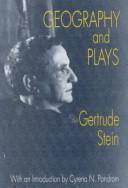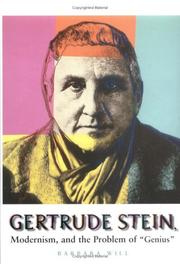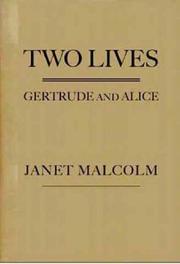| Listing 1 - 10 of 49 | << page >> |
Sort by
|
Book
ISBN: 0819575135 9780819575135 9780819575111 0819575119 9780819575128 0819575127 Year: 2014 Publisher: Middletown, CT Wesleyan University Press
Abstract | Keywords | Export | Availability | Bookmark
 Loading...
Loading...Choose an application
- Reference Manager
- EndNote
- RefWorks (Direct export to RefWorks)
A critical guide to the poetics and philosophy of Gertrude Stein
Stein, Gertrude, --- Staĭn, Gertruda, --- Stein, Gertruda, --- Criticism and interpretation.

ISBN: 0299134733 1283976145 9780299134730 0299134709 9780299134709 0299134741 9780299134747 Year: 1993 Publisher: Madison, Wisconsin
Abstract | Keywords | Export | Availability | Bookmark
 Loading...
Loading...Choose an application
- Reference Manager
- EndNote
- RefWorks (Direct export to RefWorks)
Stein, Gertrude, -- 1874-1946. --- English --- Languages & Literatures --- American Literature --- Stein, Gertrude, --- Staĭn, Gertruda, --- Stein, Gertruda,

ISBN: 0748699341 0585441847 9780585441849 9780748699346 0748611983 9780748611980 Year: 2022 Publisher: Edinburgh
Abstract | Keywords | Export | Availability | Bookmark
 Loading...
Loading...Choose an application
- Reference Manager
- EndNote
- RefWorks (Direct export to RefWorks)
GBS_insertPreviewButtonPopup('ISBN:9780748611980);Gertrude Stein frequently called herself a genius, but what did this term really mean for her? Stein's claims to genius are legendary, appearing frequently throughout her texts and public lectures. Were they the signs of excessive egotism, of desperate self-advertisement, or of something else entirely? This book examines the centrality and the specificity of the idea of 'genius' to Stein's work and to the aesthetic ideals and contradictory intellectual affiliations of high modernism in general. Through a chronological reading, it maps Stein's move from an early investment in an essential and essentializing notion of 'genius' to her later use of the term to describe an anti-essentialist, democratic textual process. It considers how this revisionary idea of 'genius' came to correspond with Stein's identification of herself as Jewish, queer and American. And it ends with Stein's seemingly paradoxical decision to call a text about being a genius in America, Everybody's Autobiography. Drawing upon a wide range of literary theory, cultural criticism and historical evidence, and offering new readings of previously unexamined texts by Stein, Barbara Will challenges received understandings of Stein's claims to 'genius' and of modernist literary hermeticism by reconceptualising the textual practice of this exemplary modernist writer.Key FeaturesA scholarly study of a writer who is receiving ever-increasing critical attentionThe first major scholarly study to deal with Gertrude Stein's central claim to being a geniusOffers new insight into debates over modernism, mass culture, and postmodernismCombines a historical approach with a theoretical reading inflected by postmodern thinkingOriginal, theoretically informed and consistently well-written.Gertrude Stein, Modernism, and the Problem of 'Genius' was winner of the Choice Outstanding Academic Title award in 2001."
Genius in literature. --- Modernism (Literature) --- Stein, Gertrude, --- Staĭn, Gertruda, --- Stein, Gertruda, --- Criticism and interpretation.
Book
ISBN: 1438468016 9781438468013 9781438467993 Year: 2018 Publisher: Albany, NY : State University of New York Press,
Abstract | Keywords | Export | Availability | Bookmark
 Loading...
Loading...Choose an application
- Reference Manager
- EndNote
- RefWorks (Direct export to RefWorks)
Arguing that Gertrude Stein's monumental novel The Making of Americans models a radically aesthetic relation to the world, E. L. McCallum demonstrates how the novel teaches us to read differently, unmaking our habits of reading. Each of the chapters works through close readings of Stein's text and a philosophical interlocutor to track a series of theoretical questions: what forms queer time, what are the limits of story, how do we feel emotion, how can we agree on a shared reality if interpretation and imagination intervene, and how do particular media shape how we convey this rich experience? The formally innovative agenda and epistemological drive of Stein's novel stages rich thought experiments that bear on questions that are central to some of the most vibrant conversations in literary studies today. In the midst of ongoing debates about the practices of reading, the difficulty of reading, and even the impossibility of reading, the moment has come to have a fuller critical engagement with this landmark novel. This book shows how.
Stein, Gertrude, --- Staĭn, Gertruda, --- Stein, Gertruda, --- Dusman, Linda, --- Aesthetics. --- Criticism and interpretation.
Book
ISBN: 0805771689 0805790918 Year: 1976 Publisher: Boston Twayne
Abstract | Keywords | Export | Availability | Bookmark
 Loading...
Loading...Choose an application
- Reference Manager
- EndNote
- RefWorks (Direct export to RefWorks)
Women and literature --- History --- Stein, Gertrude, --- Staĭn, Gertruda, --- Stein, Gertruda, --- Criticism and interpretation.

ISBN: 1281735167 9786611735166 0300137710 9780300137712 9780300125511 0300125518 9781281735164 661173516X Year: 2007 Publisher: New Haven Yale University Press
Abstract | Keywords | Export | Availability | Bookmark
 Loading...
Loading...Choose an application
- Reference Manager
- EndNote
- RefWorks (Direct export to RefWorks)
Authors, American --- Americans --- History --- Stein, Gertrude, --- Toklas, Alice B. --- Staĭn, Gertruda, --- Stein, Gertruda, --- Paris (France) --- Intellectual life
Dissertation
Year: 2020 Publisher: Liège Université de Liège (ULiège)
Abstract | Keywords | Export | Availability | Bookmark
 Loading...
Loading...Choose an application
- Reference Manager
- EndNote
- RefWorks (Direct export to RefWorks)
L’acquisition des procédures est une prémisse indispensable pendant toute la durée de notre vie, pourtant les différents facteurs influençant la mémoire procédurale semblent moins clairs. L’influence d’un agent stressant pendant l’apprentissage produit des effets inconsistants dans la littérature actuelle. Les cinq dimensions de la personnalité ont été évaluées selon le modèle des Big Five comme explication possible à ce phénomène. 80 sujets simulés provenant de la population normale ont été évalués dans une tâche de dessin en miroir informatisée. La personnalité était évaluée avec le BFI-Fr ainsi que le niveau d’anxiété habituel par le STAI. L’un des groupes (N=40) a été soumis à la version stressante du MAST, l’autre groupe (N=40) à la version non-stressante. L’apprentissage procédural à été évalué par la performance des sujets dans le dessin en miroir en condition simple et dans une condition de double tâche, utilisant une tâche d’interférence auditive. Les résultats ne mettent en évidence aucune différence significative quant à la performance entre les deux groupes ce qui plaide pour l’implication variable de processus d’apprentissage explicites et implicites pendant la phase d’apprentissage. Les évaluations des mesures objectives de stress comme la fréquence cardiaque, la pression artérielle, le niveau de cortisol et les évaluations subjectives utilisant des échelles visuelles analogues indiquent que le groupe expérimental a été significativement plus stressé sur un niveau physiologique que le groupe contrôle sans qu’il y ait de différences d’anxiété en tant que trait habituel entre les deux groupes. Malgré l’augmentation significative du niveau d’alpha-amylase salivaire dans le groupe expérimental après la passation du MAST, nous ne pouvons pas conclure que ce groupe a été significativement plus stressé sur un niveau psychologique que le groupe de contrôle en raison d’une différence statistiquement non-significative entre ces deux groupes. Néanmoins, plusieurs résultats vont dans le sens de nos hypothèses de base. Nous avons mis en évidence un lien positif significatif entre l’ouverture (O) et le neuroticisme (N) dans le groupe contrôle et entre l’extraversion (E) dans la condition stressante avec l’apprentissage procédural. Aucun lien significatif a été mis en évidence pour la consciencieusité (C) et l’agréabilité (A). La présente étude présente toutefois plusieurs limites. L’impossibilité de tester des individus en conditions réelles nous a amené à baser les résultats sur des données obtenues par simulation à partir de recherches antérieures. Nous n’avons pas pu mettre en évidence des symptômes de stress psychologique plus élevés dans le groupe expérimental. Les sujets présentent davantage des symptômes d’un stress physiologique qui pourraient avoir des répercussions différentes à celle de l’activation d’un stress purement psychologique. Dans de futures recherches, l’influence des différentes sous-facettes devrait être étudiée plus spécifiquement afin d’obtenir une image plus différenciée des effets mis en évidence pour les cinq grandes dimensions de la personnalité. L’hétérogénéité importante au sein de la mémoire procédurale renvoie à une difficulté de généralisation des liens que nous avons pu observer lors d’apprentissages procéduraux autres que le dessin en miroir. Des futures recherches seraient nécessaires afin d’obtenir une image plus différencié des effets mis en évidence.
personnalité --- apprentissage procédural --- stress --- MAST --- BFI-Fr --- STAI --- ouverture --- consciencieusité --- extraversion --- agréabilité --- neuroticisme --- Sciences sociales & comportementales, psychologie > Psychologie cognitive & théorique
Book
ISBN: 1283300680 9786613300683 0231526415 9780231526418 9780231152624 0231152620 0231152639 Year: 2011 Publisher: New York, NY
Abstract | Keywords | Export | Availability | Bookmark
 Loading...
Loading...Choose an application
- Reference Manager
- EndNote
- RefWorks (Direct export to RefWorks)
In 1941, the Jewish American writer and avant-garde icon Gertrude Stein embarked on one of the strangest intellectual projects of her life: translating for an American audience the speeches of Marshal Philippe Pétain, head of state for the collaborationist Vichy government. From 1941 to 1943, Stein translated thirty-two of Pétain's speeches, in which he outlined the Vichy policy barring Jews and other "foreign elements" from the public sphere while calling for France to reconcile with Nazi occupiers.Unlikely Collaboration pursues troubling questions: Why and under what circumstances would Stein undertake this project? The answers lie in Stein's link to the man at the core of this controversy: Bernard Faÿ, Stein's apparent Vichy protector. Faÿ was director of the Bibliothèque Nationale during the Vichy regime and overseer of the repression of French freemasons. He convinced Pétain to keep Stein undisturbed during the war and, in turn, encouraged her to translate Pétain for American audiences. Yet Faÿ's protection was not coercive. Stein described the thinker as her chief intellectual companion during her final years. Barbara Will outlines the formative powers of this relationship, noting possible affinities between Stein and Faÿ's political and aesthetic ideals, especially their reflection in Stein's writing from the late 1920s to the 1940s. Will treats their interaction as a case study of intellectual life during wartime France and an indication of America's place in the Vichy imagination. Her book forces a reconsideration of modernism and fascism, asking what led so many within the avant-garde toward fascist and collaborationist thought. Touching off a potential powder keg of critical dispute, Will replays a collaboration that proves essential to understanding fascism and the remaking of modern Europe.
Politics and literature --- History --- Faÿ, Bernard, --- Stein, Gertrude, --- Staĭn, Gertruda, --- Stein, Gertruda, --- Friends and associates. --- France --- Intellectual life --- Fay, Bernard,
Book
ISBN: 0817387943 9780817387945 9780817318529 0817318526 Year: 2014 Publisher: Tuscaloosa University of Alabama Press
Abstract | Keywords | Export | Availability | Bookmark
 Loading...
Loading...Choose an application
- Reference Manager
- EndNote
- RefWorks (Direct export to RefWorks)
"The central premise of Gertrude Stein and the Reinvention of Rhetoric is that Gertrude Stein can and should be recognized as one of the twentieth century's preeminent rhetoricians, ever so much as a literary modernist and innovator. The relationship between rhetorical studies and literary studies remains a vexed one, due in part to rhetoric's contemporary affiliation with composition, rendering its institutional position separate from, if not subordinate to, the study of literature. Gertrude Stein's writing recognizes no such distinctions, making it ripe for a fresh analytical lens. Sharon J. Kirsch positions Gertrude Stein--a iconic and canonical figure of early literary modernism--as a major twentieth-century rhetorician whose conception of language challenges, satirizes, and reinvents the five classical canons of rhetoric: invention, arrangement, style, memory, and delivery. More than a literary figure or even a premier modernist or proto-postmodernist innovator, as she is so often read, Stein's interest in language, in all its possible forms, transcends modern disciplinary boundaries and remains grounded in rhetorical culture"-- "Gertrude Stein is recognized as an iconic and canonical literary modernist. In Gertrude Stein and the Reinvention of Rhetoric, Sharon J. Kirsch broadens our understanding of Stein's influence to include her impact on the field of rhetoric. For humanities scholars as well as popular audiences, the relationship between rhetoric and literature remains vexed, in part due to rhetoric's contemporary affiliation with composition, which makes it separate from, if not subordinate to, the study of literature. Gertrude Stein recognized no such separation, and this disciplinary policing of the study of English has diminished our understanding of her work, Kirsch argues. Stein's career unfolded at the crossroads of literary composition and rhetorical theory, a site where she alternately challenged, satirized, and reinvented the five classical canons of rhetoric-invention, arrangement, style, memory, and delivery-even as she invented new trajectories of literary experimentation. Kirsch follows Stein from her days studying composition and philosophy at Harvard through her expatriate years in France, fame in the 1930's, and experience of the Second World War. She frames Stein's explorations of language as an inventive poetics that reconceived practices and theories of rhetorical invention during a period that saw the rise of literary studies and the decline of rhetorical studies. Through careful readings of canonical and lesser-known works, Kirsch offers a convincing critical portrait of Stein as a Sophistic provocateur who reinvented the canons by making a productive mess of canonical rhetoric and modernist categories of thought. Readers will find much of interest in Gertrude Stein and the Reinvention of Rhetoric. Kirsch offers myriad insights to scholars of Stein, to those interested in the interdisciplinary intersections of literature, rhetoric, and philosophy, as well as to scholars and students in the field of rhetoric and communication studies. Positioning Stein as a major twentieth-century rhetorical theorist is particularly timely given increasing interest in historical and theoretical resonances between rhetoric and poetics and given the continued lack of recognition for women theorists in rhetorical studies. "--
LANGUAGE ARTS & DISCIPLINES / Rhetoric. --- LITERARY CRITICISM / American / General. --- Stein, Gertrude, --- Staĭn, Gertruda, --- Stein, Gertruda, --- Criticism and interpretation. --- Language arts & disciplines --- Literary criticism --- Rhetorik. --- Rhetoric. --- American --- General.
Book
ISBN: 128342598X 9786613425980 0300157339 9780300157338 9781283425988 9780300153095 0300153090 Year: 2012 Publisher: New Haven ; London : Yale University Press,
Abstract | Keywords | Export | Availability | Bookmark
 Loading...
Loading...Choose an application
- Reference Manager
- EndNote
- RefWorks (Direct export to RefWorks)
In the 1950's, Yale University Press published a number of Gertrude Stein's posthumous works, among them her incomparable Stanzas in Meditation. Since that time, scholars have discovered that Stein's poem exists in several versions: a manuscript that Stein wrote and two typescripts that her partner Alice B. Toklas prepared. Toklas's work on the second typescript changed the poem when, enraged upon detecting in it references to a former lover, she not only adjusted the typescript but insisted that Stein make revisions in the original manuscript. This edition of Stanzas in Meditation is the first to confront the complicated story of its composition and revision. Through meticulous archival work, the editors present a reliable reading text of Stein's original manuscript, as well as an appendix with the textual variants among the poem's several versions. This record of Stein's multi-layered revisions enables readers to engage more fully with the author's radically experimental poem and also to detect the literary impact of Stein's relationship with Toklas. The editors' preface and poet Joan Retallack's introduction offer insight into the complexities of reading Stein's poetry and the innovative modes of reading that her works require and generate. Students and admirers of Stein will welcome this illuminating new contribution to Stein's oeuvre.
American literature --- Violet Quill (Group of writers) --- Yunge, Di (Group of writers) --- Stein, Gertrude, --- Staĭn, Gertruda, --- Stein, Gertruda, --- Criticism, Textual.
| Listing 1 - 10 of 49 | << page >> |
Sort by
|

 Search
Search Feedback
Feedback About UniCat
About UniCat  Help
Help News
News